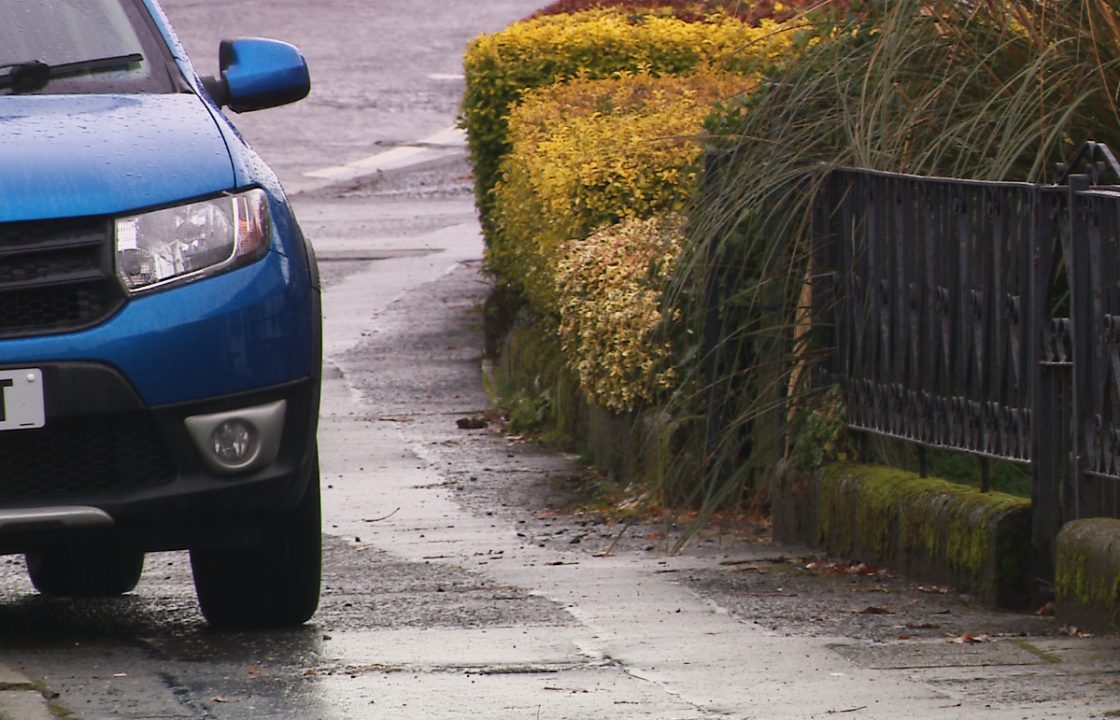Edinburgh has become the first city in Scotland to enforce a ban on pavement parking.
The ban came into force on Monday, January 29, with drivers facing a fine if they break the rules which are aimed to stop vehicles from blocking pavements and obstructing pedestrians.
It’s hoped the change will make streets safer and more accessible for pedestrians.
What are the rules?
Under the Transport (Scotland) Act 2019, local authorities now have the power to introduce new parking prohibitions.
This includes a ban on parking on pavements, at dropped kerbs and known crossing places as well as double parking.
What is the punishment for pavement parking?

Drivers caught carrying out parking offences including pavements parking face a £100 fine.
This would be reduced to £50 if paid within 14 days.
How will the rules be enforced?
In Edinburgh, parking attendants will have powers to issue penalty charge notices to vehicles parked on pavements, some verges, at crossing points or double parked.
Members of the public can also report instances of incorrect parking on footways, double parking and parking at dropped crossings online. The council has said every report will be “reviewed”.
Enforcement is likely to differ between local authorities with police being responsible for parking enforcement in places like Dumfries and Galloway and Shetland.
Are there any exemptions?
Edinburgh Council have decided that there will be no exemptions to allow anyone to park on pavements or footways in the city.
They have said the impact of the new parking rules will be monitored over the coming months to find out if any mitigation measures are needed.
Again, exemptions will likely differ in local authorities. It’s understood that exemptions will always apply to operation of emergency services, to allow the response to an emergency or accident, to allow for certain deliveries and collection and for vehicles used to for undertaking works on roads or removal of obstructions.
Why are the rules being introduced?
It’s hoped that the measures will benefit pavement users, in particular those with mobility issues or visual impairments, or parents pushing prams and buggies.
Edinburgh Council has said pavement parking prevents people from walking safely down streets and around their neighbourhoods and damages pavements which are expensive to repair and become a “trip hazard”.
They said double parking can make it dangerous for vulnerable people to cross the road, prevents people in wheelchairs from crossing the road where vehicles are parked next to dropped kerbs and can prevent communal bins from being emptied.
Kevin Lafferty, chief executive of Paths For All, said: “We support the new pavement parking ban which is to be enforced across Scotland.
“No longer will vehicles obstructing pavements and dropped kerbs be a barrier for people trying to safely navigate through their neighbourhoods.
“Speaking as CEO of Paths For All, I hear from countless community members across the country who feel restricted by pavement parking in their daily lives. Parents unable to push prams, wheelchair users forced into roads, and people with sight loss unable to access paths.
“However, this ban tangibly breaks down accessibility issues and clears the way, quite literally, for more Scots to walk and wheel safely every day.
“We’d like to praise Edinburgh for being the first city to enact this ban, and we hope the rest of the country will follow suit shortly.”
When and where will it come into force?
The rules came into force in Edinburgh on Monday, January 29.
Glasgow
Glasgow City Council has said they plan to introduce the measures in a “phased approach” with initial enforcement focusing on dropped kerbs and double parking.
Wider enforcement is expected to begin as early as March with pavement parking being dealt with on an ad-hoc basis.
West Lothian
Parking in West Lothian is currently not decriminalised meaning the local authority is unable to undertake any parking enforcement, including the new regulations.
A spokesperson said: “We are currently taking forward a Parking Strategy for West Lothian, which includes pavement parking enforcement. We anticipate that an application will be made to Scottish Ministers to allow decriminalised parking when the strategy gets to the implementation phase, but there is no agreed date for this as yet.”
Stirling
Stirling is preparing to implement the legislation in early 2024 with road exemption assessments in their final stages.
East Ayrshire
Due to the amount of logistical and operational work involved in this process, it is expected that pavement parking enforcement will begin in East Ayrshire in late 2024.
South Lanarkshire
South Lanarkshire Council has said they will implement the rules in a “balanced, proportionate and pragmatic way”.
A spokesperson said: “Initially we will ensure that any enforcement action fully considers the characteristics of an area and the impacts of any displacement experienced. Enforcement will also include the option of using advisory warning notices in the first instance and will depend on the resources available to monitor the position across what is a very big geographical area with a large number of urban areas.”
West Dunbartonshire
Parking enforcement powers in West Dunbartonshire currently sit with Police Scotland. The powers are expected to be transferred to the council this year with pavement parking enforcement coming afterwards.
South Ayrshire
South Ayrshire is aiming to introduce the measures in October 2024.
North Ayrshire
North Ayrshire Council is also assuming powers for parking enforcement from Police Scotland and anticipates parking enforcement for a range of offences, including pavement parking, will coming into force from March 2024.
East Dunbartonshire
There is no definitive date for the introduction and enforcement of the pavement parking legislation in East Dunbartonshire. The assessment of the road network for exemptions has been completed and it’s anticipated that it will be introduced midway through 2024.
Highlands
Highland Council’s parking enforcement team will be enforcing the new pavement parking ban during February.
Shetland
Informal notices will be served by Shetland Islands Council staff to drivers when a complaint is received by a member of the public and a vehicle is parked so as to obstruct a footway. These notices, at this stage, would inform the driver that they were committing an offence. Police Scotland will thereafter enforce any penalties as necessary, including fines.
Inverclyde
Inverclyde Council is currently assessing the requirements of enforcing the ban before anything can progress. They are also looking at issues including resources and funding.
Aberdeen
Enforcement in Aberdeen is expected to start in early 2024.
Aberdeenshire
Aberdeenshire is still in the education phase with warning notices being issued.
Renfrewshire
The ban is expected to come into force in November 2024 in Renfrewshire.
East Renfrewshire
There is currently no timescale for enforcement in East Renfrewshire.
Falkirk
Falkirk will be initially raising awareness of the new legislation with advisory notices starting in early 2024 for a period of six months. This will allow time for drivers to understand the changes and for Falkirk Council staff to be trained in enforcement.
Moray
A Moray Council spokesperson said: “The enactment of the legislation grants discretionary powers which the council may choose to use. This will be subject of future discussion by the council.
East Lothian
East Lothian is assessing the streets which may be exempt from the new legislation and says it supports the ban.
The council says enforcement is expected to begin this year.
Fife
The ban won’t be enforced in Fife “until work to identify exemption areas is completed and approval is given by members at Cabinet Committee”.
Dumfries and Galloway
Dumfries and Galloway also don’t have decriminalised parking enforcement (DPE) and won’t be initially be issues penalty charge notices.
The council is currently producing a new Regional Parking Strategy that is considering DPE and a decision by a council committee is expected in early 2024.
Following the decision outcome, a formal application may then be submitted to Transport Scotland to transfer stationary traffic offences to become civil penalties imposed by our local authority. Enforcement of certain parking offences such as obstructive or dangerous parking will remain the responsibility of Police Scotland.
Orkney
A spokesperson for Orkney Council said: “As Scotland’s smallest local authority the costs of bringing in DPE does not stack up for our community. Instead we work with our communities to encourage and raise awareness of the need for considerate parking including for wheelchair users, buggies and young families, and council and emergency services vehicles.”
Angus
Implementation in Angus will be in the early part of this year, with a period of education rather than enforcement in advance of clear communication over when penalty notices will start to be handed out.
Scottish Borders
A spokesperson for Scottish Borders Council said: “Although the new legislation has now been enacted, Scottish Borders Council, like most other Scottish local authorities, still has some work to undertake in identifying locations where an exemption might be justified. The Council ran a survey on footway parking late last year where over 200 responses were collected and a total of 168 locations identified for further investigation.
“Exemption orders will be used to allow parking on the footway if its layout or character would allow for a width of 1.5 metres of the footway to remain unobstructed when any part of a vehicle is parked on it, or the layout or character of the carriageway associated with the footway is such that the passage of an emergency vehicle would not be impeded by the presence of a vehicle parked on the carriageway.
“It is therefore anticipated that this process will be complete in March/April 2024. After which, it is anticipated that the necessary back office processes and systems will be in place to allow enforcement.
“That being the case the intention will be to focus on educating drivers across the region, prior to any enforcement action being undertaken. Any enforcement action will have to be carried out within existing council budget and staffing levels at reported locations.”
Follow STV News on WhatsApp
Scan the QR code on your mobile device for all the latest news from around the country






























